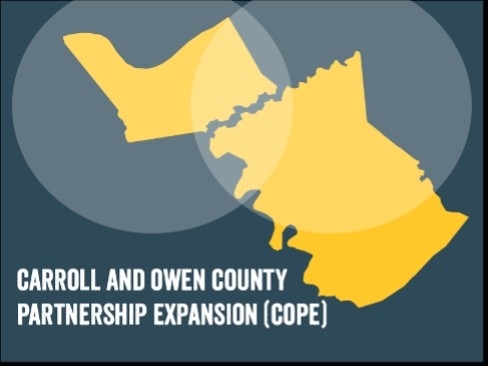
COPE is funded through the Rural Responses to the Opioid Epidemic initiative which is co-funded by the Bureau of Justice Assistance, the Centers for Disease Control and Prevention, and the State Justice Institute, to support sites in reducing the morbidity and mortality associated with opioid overdoses among individuals who come in contact with law enforcement or are involved in the criminal justice system in high-risk rural communities and regions.
COPE, via funding through Northern Kentucky University, worked with its partners to establish an overdose fatality review team with the goal of identifying missed opportunities for prevention or gaps in local service delivery.
COPE expanded an already existing data reporting tool to track drug-related incidents, promoted education/prevention programs for faith leaders (including Naloxone), developed a prevention program for youth and established Carroll County Drug Prevention Coalition.
COPE provided a comprehensive toolkit of resources to support Carroll County Schools, including moral reconation therapy training for staff, students, and families; substance use disorder (SUD)/mental health training; screening, brief intervention, and referral to treatment training; and on-site therapy access.
COPE has expanded a SUD care coordination system already in place throughout Owen County and Carroll County to function as a cross-county HUB that connects care coordinators and reentry specialists to both.
COPE expanded training for first responders and key stakeholders across the county justice system.
COPE supported regional implementation of an “on-demand” transportation system for medical/SUD transport and implemented a media campaign to inform the public of this system.
Lastly, COPE supported recovery through establishing new recovery groups and increasing behavioral health access in the detention center and across the broader community.
During the 18-month implementation phase, the sites will initiate new activities or augment existing efforts to strengthen epidemiologic surveillance and public health data infrastructure, implement effective community-level opioid overdose prevention activities, and establish or enhance public safety, public health, and behavioral health collaborations. Sites may also elect to leverage funding to expand peer recovery and recovery support services that help people start and stay in recovery.
Carroll County Care Coordinator Yvonne Poe led the Hope Bags project to provide re-entry supplies for people needing assistance. Carroll County Drug Prevention Coalition Coordinator Tammy Barrett-Wolcott and Re-entry Coordinator Donnie Dawes are working with the area schools and the Carroll County Detention Center to provide Moral Reconation Therapy (MRT) to struggling youths and detainees.
Tammy Barrett-Wolcott
Carroll County Drug Prevention Coordinator
Institute for Health Innovation
Barrettwot1@nku.edu
C: (502) 851-6267
Donnie L. Dawes
Carroll County Reentry Specialist
Institute for Health Innovation
Dawesd1@nku.edu
C: (502) 558-2576
Yvonne Poe, RN
Carroll County Care Coordinator
Institute for Health Innovation
Poen2@nku.edu
With opioid overdoses rising again, a new plan emerges to improve access to treatment in rural areas, Soapbox Cincinnati
NKU, counties launch program as overdose rates double, WTVQ
NKU Expands Opioid Recovery Program in Rural Counties, River City News
NKU Expands Opioid Recovery Programs
Federal grant creates Northern Kentucky University’s Rural Responses to the Opioid Epidemic Program, NKY Tribune
NKU Battling Opioids, Fox19
Federal Grant Creates NKU's Rural Responses to the Opioid Epidemic Program